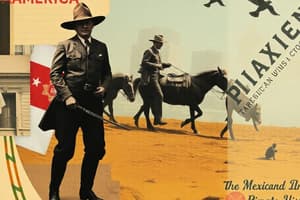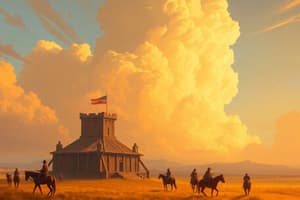Podcast
Questions and Answers
What was the outcome of the Mexican-American War?
What was the outcome of the Mexican-American War?
- The US gained control of a significant amount of land, including present-day California, Nevada, Utah, Arizona, New Mexico, Texas, and parts of Colorado, Kansas, Oklahoma, and Wyoming (correct)
- The US established a new government in Mexico
- The US gained control of Florida from Spain
- The US lost control of the Oregon Territory
What was the main route used by settlers traveling to the Oregon Territory?
What was the main route used by settlers traveling to the Oregon Territory?
- California Trail
- Santa Fe Trail
- Oregon Trail (correct)
- Appalachian Trail
Who was the first president of the United States under the Constitution?
Who was the first president of the United States under the Constitution?
- John Adams
- James Madison
- Thomas Jefferson
- George Washington (correct)
What was established during Hamilton's Financial System?
What was established during Hamilton's Financial System?
What was the main reason for the mass migration of people to California during the 1840s and 1850s?
What was the main reason for the mass migration of people to California during the 1840s and 1850s?
What was the main ideology behind the westward expansion of the US?
What was the main ideology behind the westward expansion of the US?
Which of the following established the principle of judicial review?
Which of the following established the principle of judicial review?
What was the main purpose of the Underground Railroad?
What was the main purpose of the Underground Railroad?
What was the outcome of the Dred Scott Decision?
What was the outcome of the Dred Scott Decision?
What was the primary issue that led to the Civil War?
What was the primary issue that led to the Civil War?
What was the significance of the Emancipation Proclamation?
What was the significance of the Emancipation Proclamation?
What was the main goal of the Reconstruction Era?
What was the main goal of the Reconstruction Era?
What was the outcome of the Missouri Compromise?
What was the outcome of the Missouri Compromise?
What was the significance of the 13th Amendment?
What was the significance of the 13th Amendment?
Flashcards are hidden until you start studying
Study Notes
Westward Expansion
- Louisiana Purchase (1803): US doubles in size with the acquisition of land from France, sparking westward expansion
- Manifest Destiny (1840s): ideology that the US is destined to expand its territory across North America
- Mexican-American War (1846-1848): US gains control of a significant amount of land, including present-day California, Nevada, Utah, Arizona, New Mexico, Texas, and parts of Colorado, Kansas, Oklahoma, and Wyoming
- Oregon Trail (1841-1869): major route for settlers traveling to the Oregon Territory
- California Gold Rush (1848-1855): mass migration of people to California, leading to rapid settlement and statehood
Early American Republic
- Constitutional Government (1789): establishment of the US government under the Constitution
- Washington's Presidency (1789-1797): sets precedent for the office of the presidency
- Hamilton's Financial System (1790s): establishes a national bank, tariffs, and assumption of state debts
- Jefferson's Presidency (1801-1809): promotes limited government and individual liberties
- Marbury v. Madison (1803): establishes the principle of judicial review
Slavery and Abolition
- Three-Fifths Compromise (1787): counts enslaved people as 3/5 of a person for representation purposes
- Missouri Compromise (1820): admits Missouri as a slave state and bans slavery in the Louisiana Territory north of the 36°30' parallel
- Abolitionist Movement (1830s): grows in response to the horrors of slavery, with prominent figures like William Lloyd Garrison and Frederick Douglass
- Underground Railroad ( late 18th century-1850s): network of secret routes and safe houses for escaping enslaved people
- Fugitive Slave Act (1850): requires Northerners to assist in the capture and return of escaped enslaved people
Civil War and Reconstruction
- Kansas-Nebraska Act (1854): repeals the Missouri Compromise, leading to pro-slavery and anti-slavery violence in Kansas
- Dred Scott Decision (1857): declares that enslaved people are not citizens and have no right to sue in court
- Lincoln's Election (1860): sparks secession of Southern states, leading to the Civil War
- Civil War (1861-1865): fought between the Union (North) and Confederacy (South) over slavery and states' rights
- Emancipation Proclamation (1863): declares freedom for all enslaved people in Confederate territory
- Reconstruction Era (1865-1877): attempts to rebuild the South and establish civil rights for formerly enslaved people
- 13th Amendment (1865): abolishes slavery
- 14th Amendment (1868): grants citizenship to formerly enslaved people and protects their civil rights
Westward Expansion
- The Louisiana Purchase of 1803 doubles the size of the US, acquiring land from France and sparking westward expansion.
- The ideology of Manifest Destiny emerges in the 1840s, believing the US is destined to expand its territory across North America.
- The Mexican-American War (1846-1848) results in the US gaining control of a significant amount of land, including present-day California, Nevada, Utah, Arizona, New Mexico, Texas, and parts of Colorado, Kansas, Oklahoma, and Wyoming.
- The Oregon Trail (1841-1869) serves as a major route for settlers traveling to the Oregon Territory.
- The California Gold Rush (1848-1855) leads to a mass migration of people to California, resulting in rapid settlement and statehood.
Early American Republic
- In 1789, the US government is established under the Constitution, marking the beginning of a constitutional government.
- George Washington's presidency (1789-1797) sets precedent for the office of the presidency.
- Alexander Hamilton's Financial System in the 1790s establishes a national bank, tariffs, and assumption of state debts.
- Thomas Jefferson's presidency (1801-1809) promotes limited government and individual liberties.
- The Marbury v. Madison case in 1803 establishes the principle of judicial review.
Slavery and Abolition
- The Three-Fifths Compromise of 1787 counts enslaved people as 3/5 of a person for representation purposes.
- The Missouri Compromise of 1820 admits Missouri as a slave state and bans slavery in the Louisiana Territory north of the 36°30' parallel.
- The Abolitionist Movement grows in the 1830s in response to the horrors of slavery, with prominent figures like William Lloyd Garrison and Frederick Douglass.
- The Underground Railroad (late 18th century-1850s) is a network of secret routes and safe houses for escaping enslaved people.
- The Fugitive Slave Act of 1850 requires Northerners to assist in the capture and return of escaped enslaved people.
Civil War and Reconstruction
- The Kansas-Nebraska Act of 1854 repeals the Missouri Compromise, leading to pro-slavery and anti-slavery violence in Kansas.
- The Dred Scott Decision of 1857 declares that enslaved people are not citizens and have no right to sue in court.
- Abraham Lincoln's election in 1860 sparks the secession of Southern states, leading to the Civil War.
- The Civil War (1861-1865) is fought between the Union (North) and Confederacy (South) over slavery and states' rights.
- The Emancipation Proclamation of 1863 declares freedom for all enslaved people in Confederate territory.
- The Reconstruction Era (1865-1877) attempts to rebuild the South and establish civil rights for formerly enslaved people.
- The 13th Amendment of 1865 abolishes slavery.
- The 14th Amendment of 1868 grants citizenship to formerly enslaved people and protects their civil rights.
Studying That Suits You
Use AI to generate personalized quizzes and flashcards to suit your learning preferences.




